-
AuthorSearch Results
-
May 5, 2025 at 5:55 pm #7915
In reply to: Cofficionados Bandits (vs Lucid Dreamers)
Amy supposed everyone was blaming her, for what she couldn’t say, but they had clearly been avoiding her. There was plenty of coffee here anyway, even if the rest of the world was suffering. Don’t even think it, she told herself sternly. We don’t want people flocking here in droves once they realise.
So, do I want people or not? she asked herself. One minute I’m wondering where everyone is, and then next minute I’m wanting everyone to stay away.
“You on the spectrum too, are you?” asked Carob, reading her mind. “It’s ok,” she added, seeing the look of alarm cross Amy’s face, “Your secret’s safe with me. I mean about being on the spectrum. But be careful, they’re rounding people like us up and sending them to a correctional facility. We’re quite lucky to be here, out of the way.”
“Have you been avoiding me?” Amy asked, which was more immediately concerning than the concentration camps. “Because I’ve been here all alone for ages, nothing to do but read my book, draw in my sketch pad, and work on my needlepoint cushion covers. And where are the others? And don’t read my mind, it’s so rude.”
“Needlepoint cushion covers? Are you serious?” Carob was avoiding the questions, but was genuinely curious about the cushion covers.
Amy blushed. “No, I made that up. In fact, I don’t know what made me say that. I haven’t started any sketching either, but I have thought about starting sketching. And I’ve been reading. It’s an old Liz Tattler; the old ones were the best. Real old school Lizzie Tattie, if you know what I mean. Risque romps with potting sheds and stuff. None of that ghastly sci fi she started writing recently.”
“Which one?” Carob asked, and laughed when Amy held it up. “I read that years ago, T’Eggy Gets a Good Rogering, can I borrow it after you? God knows we could all do with a laugh.”
“How do you know the others need a good laugh?” Amy asked, peering at Carob with an attentive squint in order to catch any clues. “You’ve seen then, then?”
Carob smiled sadly and replied, “Only by remote viewing them.”
Amy asked where they had been and what they were doing when they were viewed remotely. Has she been remote viewing me? What if they ask her if she’s been remote viewing me, and she tells them? “Oh never mind,” Amy said quickly, “No need to answer that.”
Carob snorted, and what a strangely welcome sound it was. “I didn’t really remote view them, I made that up. It never works if I try to spy on people. Fat lot of good it is really, it never works when I really really need to see something. Or maybe it works, but I never believe it properly until later when I find out it was right.”
“Yeah,” Amy said, “It’s fun though, I haven’t done it in ages.”
“You should, it would give you something to do when everyone’s avoiding you.”
August 21, 2024 at 12:27 pm #7546In reply to: The Elusive Samuel Housley and Other Family Stories
The Potters of Darley Bridge
Rebecca Knowles 1745-1823, my 5x great grandmother, married Charles Marshall 1742-1819, the churchwarden of Elton, in Darley, Derbyshire, in 1767. Rebecca was born in Darley in 1745, the youngest child of Roger Knowles 1695-1784, and Martha Potter 1702?-1772.
Although Roger and Martha were both from Darley, they were married in South Wingfield by licence in 1724. Roger’s occupation on the marriage licence was lead miner. (Lead miners in Derbyshire at that time usually mined their own land.) Jacob Potter signed the licence so I assumed that Jacob Potter was her father.
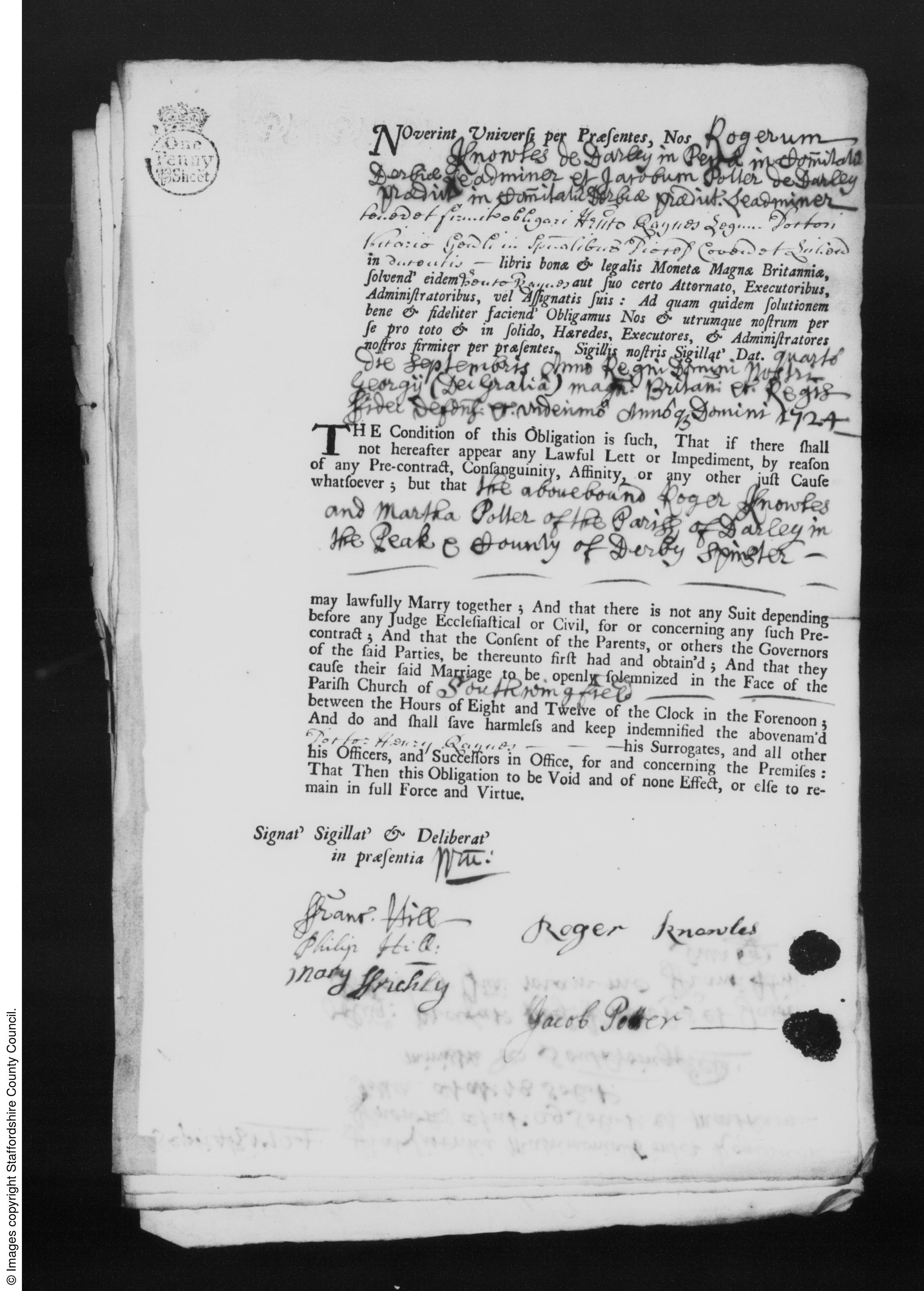
I then found the will of Jacobi Potter who died in 1719. However, he signed the will James Potter. Jacobi is latin for James. James Potter mentioned his daughter Martha in his will “when she comes of age”. Martha was the youngest child of James. James also mentioned in his will son James AND son Jacob, so there were both James’s and Jacob’s in the family, although at times in the documents James is written as Jacobi!
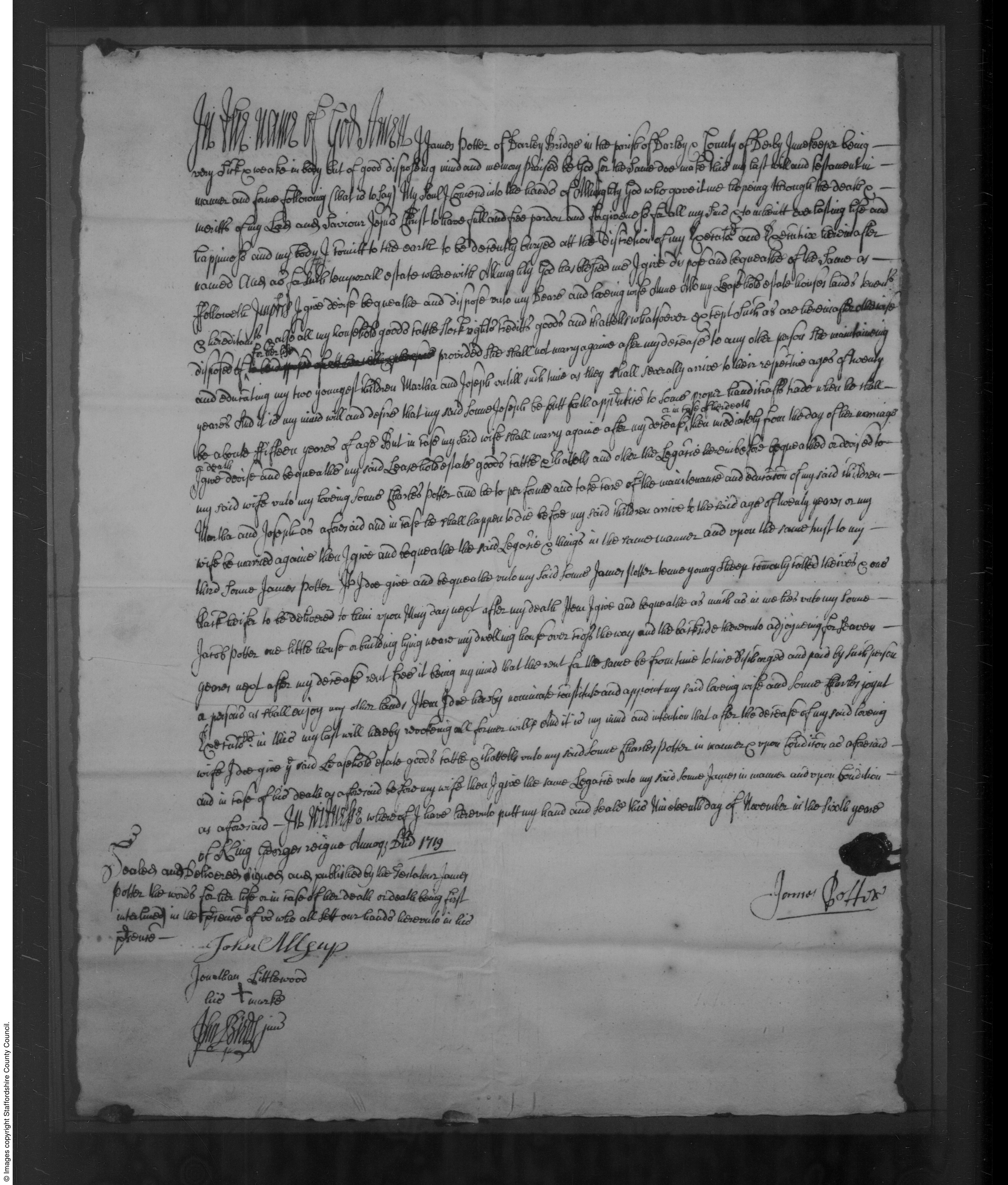
Jacob Potter who signed Martha’s marriage licence was her brother Jacob.
Martha’s brother James mentioned his sister Martha Knowles in his 1739 will, as well as his brother Jacob and his brother Joseph.
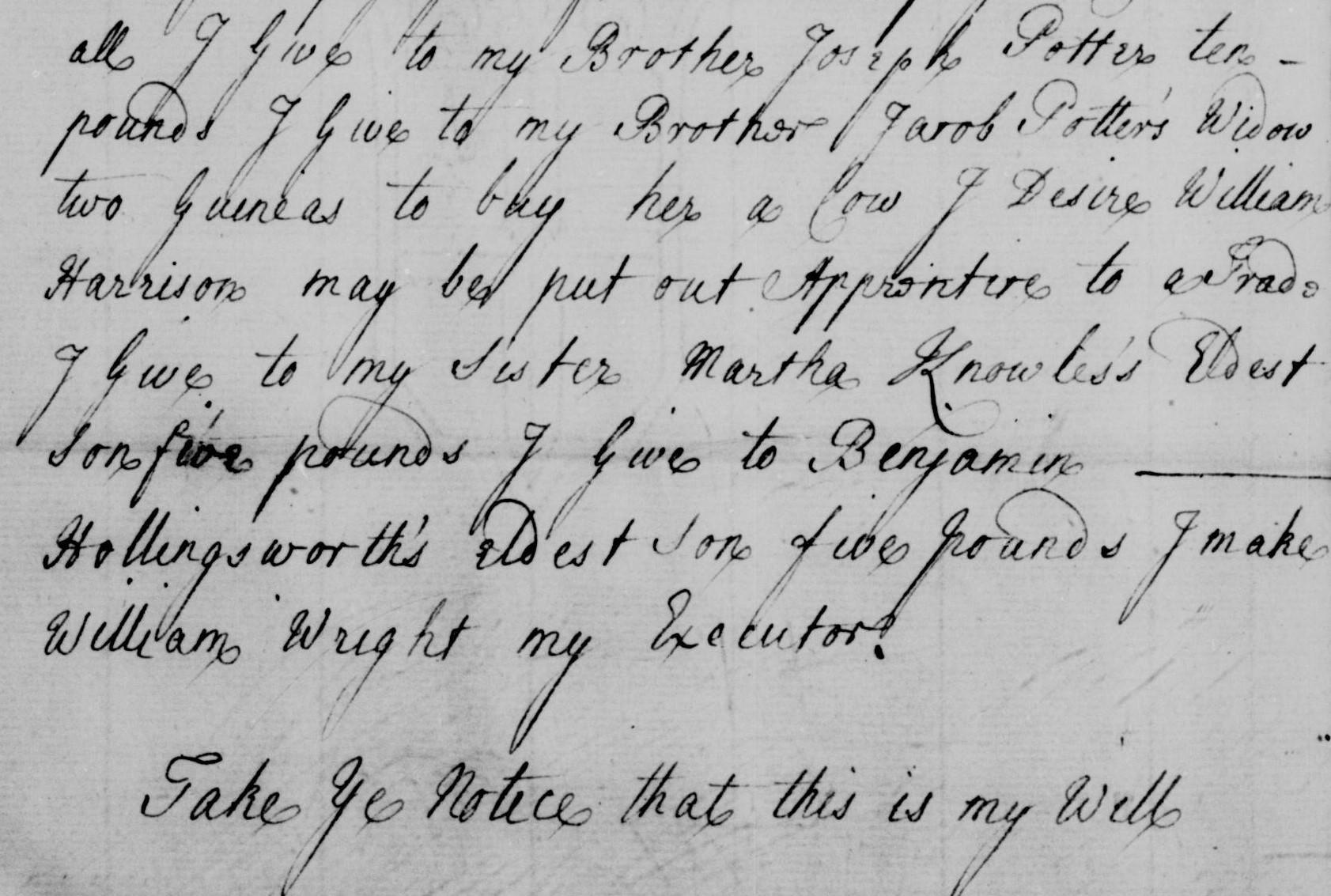
Martha’s father James Potter mentions his wife Ann in his 1719 will. James Potter married Ann Waterhurst in 1690 in Wirksworth, some seven miles from Darley. James occupation was innkeeper at Darley Bridge.
I did a search for Waterhurst (there was only a transcription available for that marriage, not a microfilm) and found no Waterhursts anywhere, but I did find many Warhursts in Derbyshire. In the older records, Warhust is also spelled Wearhurst and in a number of other ways. A Martha Warhurst died in Peak Forest, Derbyshire, in 1681. Her husbands name was missing from the deteriorated register pages. This may or may not be Martha Potter’s grandmother: the records for the 1600s are scanty if they exist at all, and often there are bits missing and illegible entries.
The only inn at Darley Bridge was The Three Stags Heads, by the bridge. It is now a listed building, and was on a medieval packhorse route. The current building was built in 1736, however there is a late 17th century section at rear of the cross wing. The Three Stags Heads was up for sale for £430,000 in 2022, the closure a result of the covid pandemic.
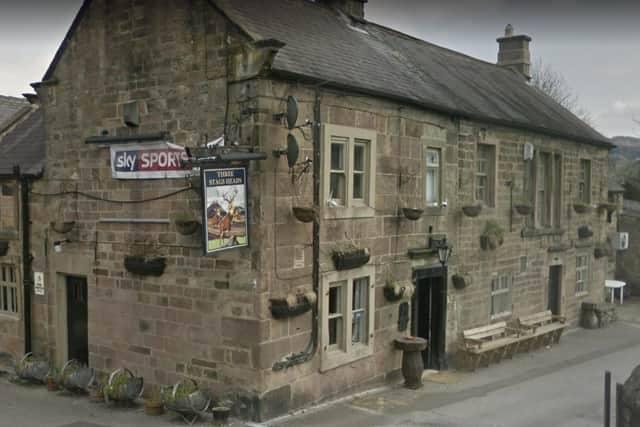
Another listed building in Darley Bridge is Potters Cottage, with a plaque above the door that says “Jonathan and Alice Potter 1763”. Jonathan Potter 1725-1785 was James grandson, the son of his son Charles Potter 1691-1752. His son Charles was also an innkeeper at Darley Bridge: James left the majority of his property to his son Charles.
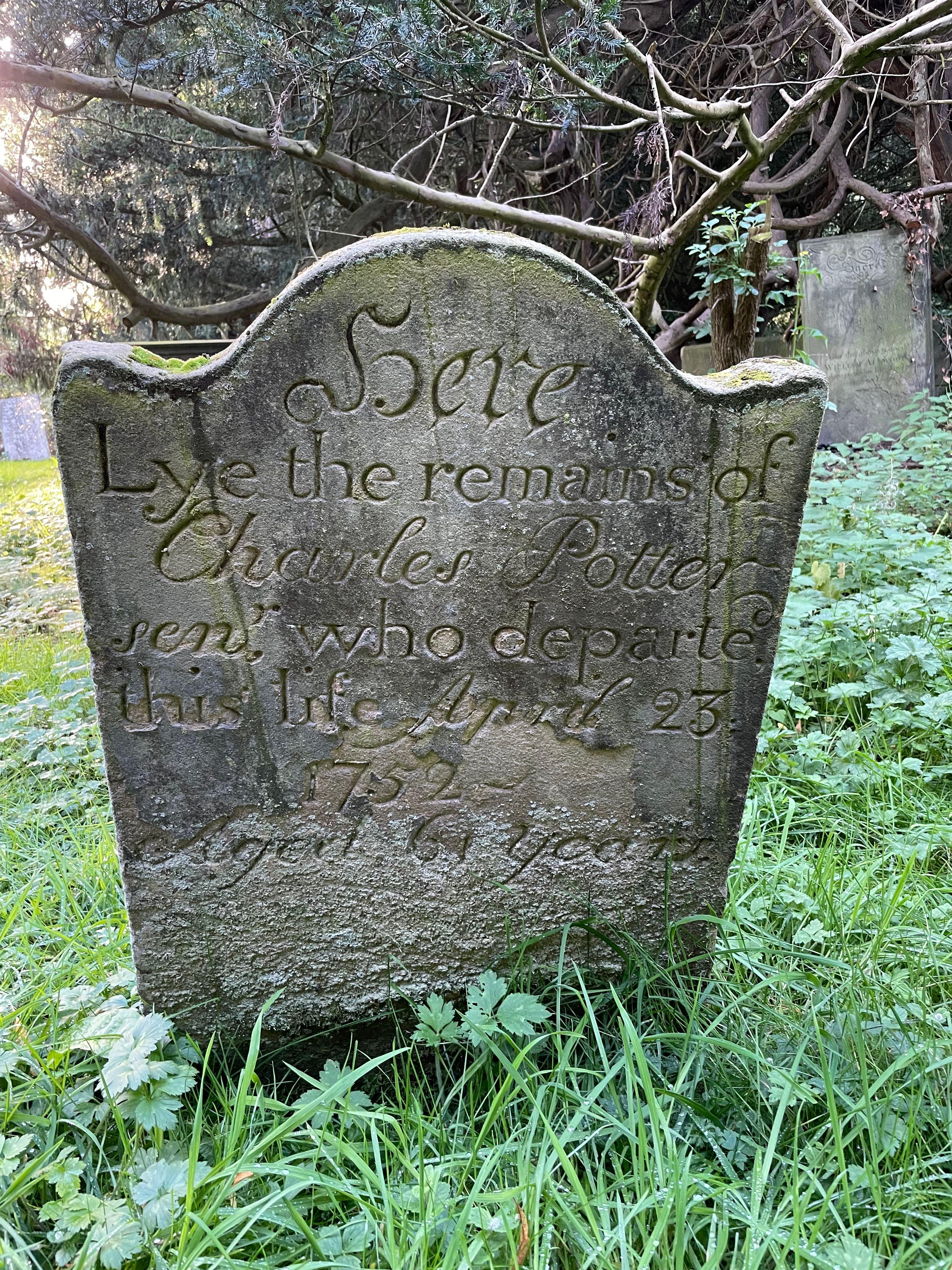
Charles is the only child of James Potter that we know the approximate date of birth, because his age was on his grave stone. I haven’t found any of their baptisms, but did note that many Potters were baptised in non conformist registers in Chesterfield.
Potters Cottage
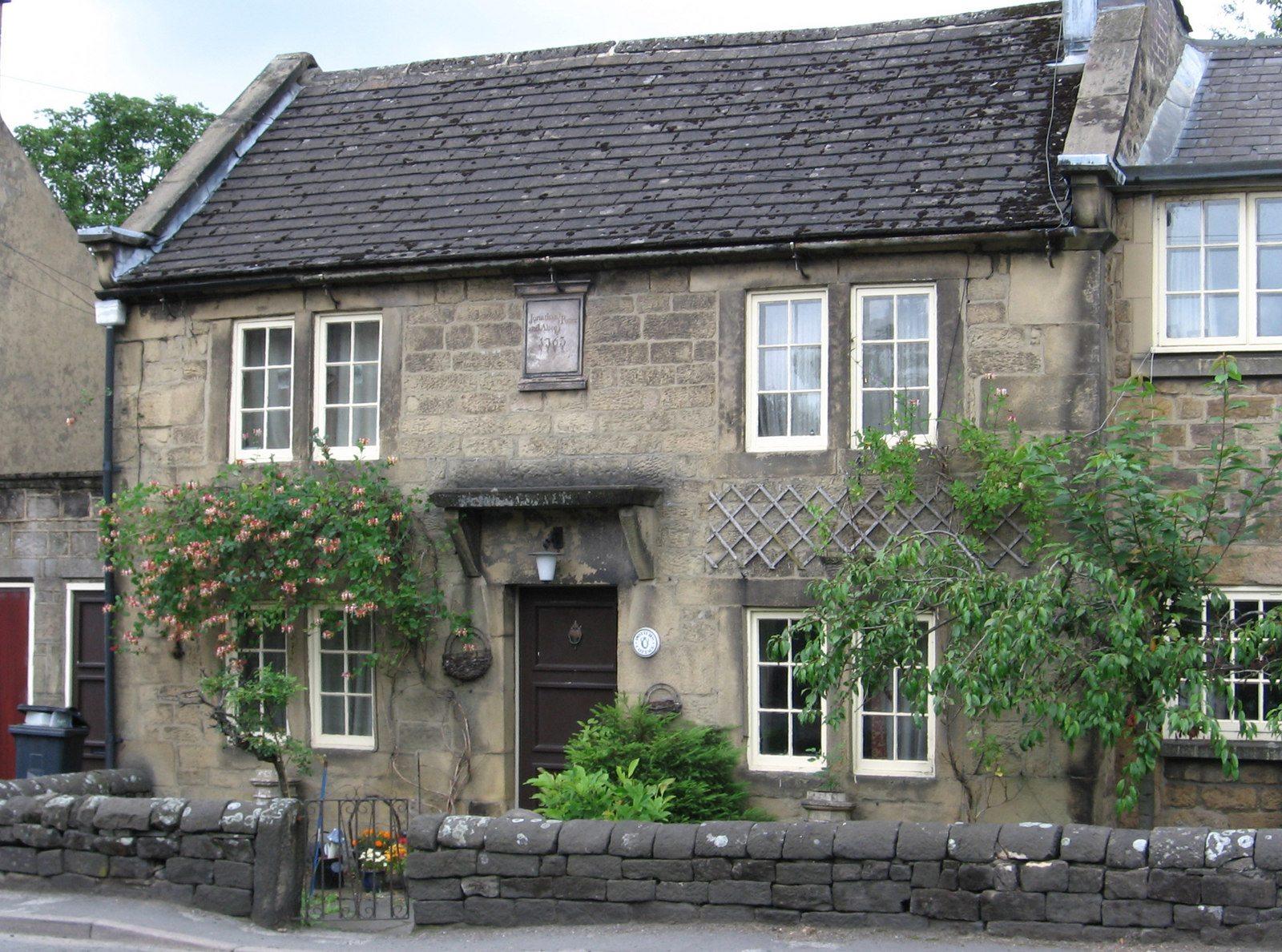
Jonathan Potter of Potters Cottage married Alice Beeley in 1748.
“Darley Bridge was an important packhorse route across the River Derwent. There was a packhorse route from here up to Beeley Moor via Darley Dale. A reference to this bridge appears in 1504… Not far to the north of the bridge at Darley Dale is Church Lane; in 1635 it was known as Ghost Lane after a Scottish pedlar was murdered there. Pedlars tended to be called Scottish only because they sold cheap Scottish linen.”
via Derbyshire Heritage website.
According to Wikipedia, the bridge dates back to the 15th century.
March 24, 2024 at 9:59 pm #7413In reply to: The Incense of the Quadrivium’s Mystiques
It wasn’t until late the following afternoon that Truella, with a pang of guilt, remembered Roger. Frella grinned sheepishly and said that she had forgotten him too.
“But you know what? Wait, let me show you the tile I bought in Brazil.” Frella trotted off to find her suitcase.
“Look what it says on the bit of paper that came with it:
Function: The Freevole tile embodies the essence of empowerment and autonomy. It serves as a reminder and a guide for those standing at life’s many crossroads, facing decisions that may seem overwhelming. This tile encourages the holder to recognize their inner strength and the ability to choose their path confidently, even when faced with seemingly insurmountable challenges.
At the center of the tile, there is a small vole standing at a crossroads where waters intersect, with dry earth visible behind it. The scene depicts sheets of water overlapping on both sides of the vole, creating a sense of inundation, yet there is an opening ahead, suggesting a path or choice to be made.We need to backtrack a bit with Roger. Look what it says here:
What that vole hadn’t realized was that he had to backtrack a bit. There was no way ahead or to the sides, but the way out was behind him.
See what I mean?”
Truella squinted at Frella. “What?”
Sighing, Frigella thrust the bit of paper at her friend. “Read the rest of it!”
The Vole: The vole symbolizes the individual facing a decision point or crossroads in life. Its presence suggests vulnerability, but also resilience and adaptability.
Crossing of Waters: The intersection of waters represents the convergence of different paths or possibilities. It symbolizes the complexities and challenges of decision-making, where multiple options overlap and intertwine.
Dry Earth Behind: The dry earth behind the vole symbolizes stability, past experiences, or familiar ground. It represents the foundation upon which decisions are based and serves as a reminder of where one has come from.
Overlap of Drowned Sheets of Water: The drowned sheets of water on both sides signify the potential consequences or risks associated with each choice. They represent the unknown and the possibility of being overwhelmed by circumstances.
Opening Ahead: The opening ahead signifies opportunity, hope, and the possibility of forging a new path. It represents the future and the freedom to make choices that lead to growth and fulfilment.Families: This tile is aligned with the Vold family, known for their connection to transformation, challenge, and the breaking of old systems to make way for the new. The Vold energy within the Freevole tile emphasizes the importance of facing challenges head-on and using them as opportunities for growth and empowerment.
Significance: The scene depicted on the Freevole tile, with the vole at a crossroads between inundation and dry earth, symbolizes the moments in life where we must make significant choices amidst emotional or situational floods. The waters represent challenges and emotions that may threaten to overwhelm, while the dry earth symbolizes the solid ground of our inner strength and determination. The path ahead, though uncertain, indicates that there is always a way forward, guided by our autonomy and personal power.
As an advice: When encountering the Freevole tile, take it as a sign to pause and reflect on your current crossroads. It urges you to tap into your inner resilience and recognize that you have the power to navigate your life’s journey. The choices before you, while daunting, are opportunities to assert your independence and steer your life according to your true desires and values. Trust in your ability to make decisions that will lead you to your chosen path of fulfillment and growth. Remember, the floods of challenge bring with them the nourishment needed for new beginnings; it is within your power to find the opening and move forward with courage and confidence.
The motif of the Freevole, standing determined and attentive amidst the forces of nature, serves as a potent symbol of the power within each individual to face life’s uncertainties and emerge stronger for having made their own choices.“Ok so in a nutshell,” Truella replied slowly, “Roger’s crossroads took him to Brazil and ours took us here, and that’s all that needs to be said about it. Right?”
“Exactly!”
February 24, 2024 at 7:51 pm #7387In reply to: The Incense of the Quadrivium’s Mystiques
The full moon was rising behind the mountains as Frigella turned off the road for the last lap of the journey down a dirt track. Daunted at first by the thought of the long drive, the prospect of a weeks holiday had lifted her spirits. There was altogether too much going on of late for a simple country hedge witch, and that carnaval mayhem had made her grumpy and withdrawn, but the drive had restored her equilibrium.
Truella rolled down the passenger window and laughed as the cool night air rushed in. “Nearly there now, I can hardly believe I made it back in one piece.”
“You and me both,” laughed Frigella. “There’s nothing I fancy more now than a couple of glasses of your lovely red wine but we’d better make a start on the spell to bring Roger back right away. This moon is perfect tonight.”
“I can’t see any reason why we can’t do both,” Truella grinned. Frigella started to object, and then stopped herself. They had arrived and she was on holiday and she deserved to sit and enjoy a drink with her friend and her responsibilities and obligations would just have to wait, at least for an hour or two.
“Why not indeed,” she said, “Why the hell not. You can tell me about finding the hippocampus statue in the dig. Great timing I must say, and the smoked hippo bones as well, just when we need to use that spell.”
“And a full moon as well. And it’s full all night long, we have plenty of time.”
February 21, 2024 at 5:03 pm #7384In reply to: The Incense of the Quadrivium’s Mystiques
The lyrical tones of a familiar Irish accent halted Cedric’s reluctant attempts to make the long distance phone call. He glanced up at the burly man unsuccessfully attempting to order a Guinness and said to him kindly that they probably didn’t have any anyway, even if they could understand him.
“That’s a Limerick accent if ever I heard one, and it’s good, so it is, to hear it. Are you on holiday? Cedric’s the name.”
Rogers face brightened and his broad shoulders relaxed. “I’d give anything to be back in Limerick. Can you take me home with you?”
“Are you lost, son?” Cedric asked gently. “Not to worry my boy, I’m in a bit of a pickle meself to be honest, but we’ll sort something out, eh?”
“The monkeys ran away from me, so they did,” Roger said. “Frigella’s gonna have my guts for garters so she is, when she finds out I’ve mucked it all up again.”
Cedric’s eyes widened and his heart started racing. “And who might that be?” he said, doing his best to remain outwardly calm.
“But she sent me away and then there were all those monkeys and then I don’t know what happened.”
Clearly Roger was a bit ninepence in the shilling.
February 16, 2024 at 11:19 am #7377In reply to: The Incense of the Quadrivium’s Mystiques
With the carnival in full swing, Truella was finding it hard to focus on everything that was going on. Was this mission more chaotic than usual, or did it seem that way because she wasn’t giving it her full attention? She hadn’t thought too much about Jezeel not closing the portal. She was having enough trouble stabilizing her own bilocation spell.
Where was Frigella when she needed her? And what was going on with that Cedric guy? Truella decided to go in search of her. Frigella was always good at explaining and clarifying things that she hadn’t been paying attention to.
Outside on the pavement, Truella paused to light a cigarette. The street were a cocophany of raucus banter and gay shreiks, a riot of colour and imagination and Truella stood rapt at the sights and sounds. Such a contrast from her quiet life at home in the garden with only ghosts for company. In a way Truella was glad that Roger was still missing with the pack of monkeys, rather than leaving him alone at home.
“Aye, look at all them monkey costumes, our Mavis, they’m really good int they, look just like real monkeys,” a chubby Englishwoman in a garish pink outfit said, passing by where Truella was standing.
“That’s because they ARE real monkeys, ya daft cow,” retorted her companion. “And they’re all following that big fella.”
“Ooh, that big burly chap?” piped up the third woman in the group. “I clocked him right off, come on girls, let’s go after the big boy.”
“Ooh, Sha, what are you like, ya tart.”
As the three women cackled and trotted off after the monkeys, Truella’s peaceful interlude came to an abrupt halt. What burly man with a pack of monkeys? Surely not, surely Roger and his monkeys hadn’t entered that portal that Jez forgot to close?
February 15, 2024 at 8:44 pm #7376In reply to: The Incense of the Quadrivium’s Mystiques
When they arrived at the hotel, the witches soon realized they were not the only uninvited guests here. With her keen sense of observation, Eris was the first to spot the traces left by an army of bedbugs. Tiny droppings on the mattresses and linen, blood stains left after the previous guests crushed the bugs while rolling in their bed. And the smell of dead rats was everywhere. Did they even have a cleaning staff here? When they complained, the hotel manager said: “Why do you care? Nobody comes here to sleep during carnival?”
Jeezel noticed the bug reference. Indeed, something was still bugging her after she had closed the portal. Something that should be obvious, yet was still an eyelash away from her grasp. But something more pressing was at stake. She posted pictures of the rooms and a reel of her disappointed face in front of the disaster.
“I was so happy to come to Rio for the first time. But the light is yellow and flickering. How can I show you how to do a proper Carnival makeup,” she said fluttering her eyelashes. As soon as the sound of a message well sent faded out, she started to receive support and love from her fans.
“Rio is not like that!”
“Somebody help.”
“2 bad! I’m on business trip. Wud hav luv to meet ya there!”
The sounds of likes and comments alerted Malové.
“What have you done! We were here incognito. Why don’t you go to the top of Jesus’s head and cast the Tempestarii Overture spell.”
“I could have! That would have gone viral. But we departed in such a hurry, I have left all my sapphires and stilettos in Limerick. You can’t cast that spell without them. Anyway, we don’t have to stay longer in that cesspit. One of my fans is abroad and has offered us to stay in his villa. Look at the pics! It looks as lush and gorgeous as a Jurassic park.”
Truella widened her eyes and said: “Saying that’s a big property would be an understatement. Roger would have loved to come with his new shovel.”
“Don’t even think of casting a second bilocation spell,” said Frigella. “You already look like deflated soufflé.”
“What’s the catch?” asked Eris with frown. “It looks like the kind of golden cage a king pin would own. But they have a pool.”
“He said we just have to feed the dwarf crocodiles while we are there,” said Jeezel nonplussed, looking at Truella whose eyes were ready to pop off of their sockets. Then she looked at Malové. “What do you say? You’re the eld…head witch of our coven.”
Malové’s eyebrow twitched. She was thinking fast. Little signs here and there, the orientation of the statues, the fountain, the placement of rocks that would look so random to a profane or a younger witch. Ancient earth magic? It was difficult to be sure with the framing of the pictures. Jeezel was swiping all the pictures her fan had sent her, hoping such glamour and mystery would melt Malové’s last reluctance.
“Omg! girls, we can’t refuse!” said Jeezel. “He’s got a bloat of pygmy hippos and a flamboyance of flamingos!”
As the drag witch continued to swipe the pictures, a prickle crept up Malové’s spine when she saw a familiar face amongst them.
“Look at him!” shouted Jeezel. “He’s a Gatsby with a spellbook.”
There were no more doubts for Malové about the kind of magic that had been used to build his empire. Augustus St Clair, a powerful witch indeed, and one whose invitation you couldn’t refuse especially since he now knew she was here. As one of the elders of the Rio’s witches community, she had danced the dance of rivals disguised as allies, a pas de deux filled with forced smiles and tight grips. Her words felt like needles scratching her lips when she uttered them: “Tell him we accept his invitation.”
The shouts of joy and disbelief coming from the witches couldn’t appease the memories that had resurfaced.
February 13, 2024 at 9:24 pm #7370In reply to: The Incense of the Quadrivium’s Mystiques
She knew she was being followed even before her familiar started to psst her about the dark haired cloaked stranger.
Eris couldn’t pinpoint precisely what drove her to leap headfirst into the swirling vortex. Perhaps it was a misplaced sense of duty —it was certainly not the sentiment of thrill that Malové had attempted to instill. It was probably the same habit that compelled her to eat the repulsive morsels off her plate first, working her way up to the more palatable fare.
Kirottu juoma, she muttered under her breath as she forced down the bitter potion Frigella had provided, intended to counteract the disorienting effects of the displacement spells within the vortex. Their abrupt arrival in the sultry heat of Rio caught them off guard, despite the stillness of the night.
“Would go down better with a dash of brandy” Truella said, wincing. She appeared on and off, and seemed to struggle to remain focused.
“I can’t believe it! Are you actually on a bilocating spell?” Malové asked reproachfully to Truella. “I thought it was obvious I needed your undivided attention!”
“Sorry,” Truella said after a moment of absence and a burp. “Was talking to Roger at the same time.” Then catching up with the remark, she shrugged and retorted “must have missed the fine print.”
Malové remained stoic like a serene swan above water, her mad paddling never perceptible. “No time to dawdle, we have to make preparations for the gathering of essence. “Jeezel! Are you listening?”
“Yes, M’am,… I mean Grand Hexmistress.”
The other witches looked at her like she’d blurted out something out of place. Malové chose to let it pass. “Quick now, you’re the one with the sigils to find us the perfect spot to set up our equipment.”
“Yes, yes! I’m on it!” Jeezel replied, so visibly distracted that her wig went askew by a millimeter without her noticing.
“Have you forgotten proper decorum in addressing the Head Witch? What’s happening?” Frigella drew Jeezel gently by the sleeve.
Jeezel’s eyes widened in mild panic: “I think I may have forgotten to close the portal.”
February 11, 2024 at 11:13 pm #7369In reply to: The Incense of the Quadrivium’s Mystiques
What with Roger and the monkeys still on the loose and the ghastly stench of the bowels of Limerick, it had been an unsettling and unproductive couple of days and Truella responded to the urge to forget it all as quickly as possible. She was tired and she wanted something else occupying her thoughts before she went to bed.
Without having a particular question in mind, or so she thought, as soon as she opened a chat with the latest character oracle she found herself asking, “Can you give me any tips on being open to impressions about the history of the roman and punic site in my garden, without getting in the way of the impressions with pre conceived ideas?”
To be open to impressions about the history of the Roman and Punic site in your garden, it is essential to engage a clear, receptive state of mind, much like the still surface of a pond, ready to reflect whatever may come into your view. First, I would suggest that you allow yourself moments of quietude, perhaps sitting in your garden, taking in the atmosphere, the scents, the sounds, and the energies around you. In this state of quiet receptiveness, you may begin to feel or sense the layers of history and the echoes of the past that are enfolded within the land.
Now, as for preconceived ideas, it is not a matter of eradicating them entirely, for they are part of the fabric of your thought processes. However, it is a matter of recognizing them, acknowledging their presence, and then gently setting them aside, like old books on a shelf, to make room for the new impressions that wish to make themselves known.
Let us consider a practical exercise: When you encounter a thought that feels like a rigid belief or a staunch preconception, simply notice it. Say to yourself, “Ah, there is a familiar thought. I shall set it here for now,” and imagine placing it aside. Do not struggle against it, for that only gives it more energy. Instead, treat it with a playful indifference, almost as if it were a curious object that you might ponder later. Then, open yourself to your inner senses. Allow your intuition to flow, let your imagination roam, and trust in your empathic sense to feel the history that seeps from the soil and stones.
You might even engage in a small ritual before you begin, something that signifies to yourself that you are shifting into a different mode of perception—one that is open, fluid, and unattached to existing narratives.
And remember, my friend, there is no rush. The histories and mysteries of your garden have been waiting for centuries; they will unveil themselves to you in the fullness of time, so long as you provide a welcoming space for their whispers to be heard.
the significance of the site is not merely in its chronological age but in its ability to connect you to the vast expanse of consciousness that transcends time. Each stone, each fragment of pottery, is a doorway to another now, waiting for you to step through
“Have you seen how many pieces there are?”
Truella staggered off to bed thinking about all those doorways.
February 7, 2024 at 12:26 pm #7357In reply to: The Incense of the Quadrivium’s Mystiques
Truella ordered another round of drinks and some more peanuts and then went to the toilets. When she got back to the table on the sidewalk, Roger’s glass was empty and the peanuts had been eaten but there was no sign of Roger. Truella assumed that he’d also gone to the toilets, but after a quarter of an hour and he hadn’t returned, she asked the waiter to check on him. The waiter returned and informed her that nobody was in the mens toilet, and then a woman on the next table said that she’d noticed Truella’s friend making strange noises and that he had wandered off up the road.
“What kind of strange noises? And which way did he go?”
“Well, to be honest, monkey noises. He sounded like a chimpanzee,” the woman replied, looking a little embarrassed. “And he went that way,” she said, pointing towards where the monkeys had been trampolining on the shop awnings just down the road.
Truella looked in the direction she was pointing. “But where are the monkeys now?”
“Well,” the woman replied looking even more embarrassed, “They all followed your friend down the road. I don’t know where they are now.”
Truella took a hasty gulp of her drink, stood up and called the waiter over and asked for the bill. Without waiting for her change she ran down the street calling Rogers name. It crossed her mind that a locating spell would have been useful but she didn’t have time for that. Instead she asked some passers by where the monkeys were now.
The young couple turned and pointed behind them. “They all ran down that way, right down the middle of the road, crazy it was, stopped all the traffic. And they were all running after that big man!”
Truella started running in that direction and then stopped, gasping. It was no good, she’d never catch them up. Slowly she walked back to her car, wondering what to do next.
February 6, 2024 at 8:23 am #7354In reply to: The Incense of the Quadrivium’s Mystiques
By the time night fell over the Mediterranean village, the monkeys were still on the loose, having defied all attempts to capture them. Truella decided to go and see for herself, having noticed that all the photographs in the news were rubbish. She knew she could do better than that. The authorities were supposedly trying to capture them, but all she’d seen from the photos were the police standing in the narrow streets looking baffled, staring up at the primates scampering all over the rooftops and swinging from balcony to balcony.
Where had all the monkeys come from? Was it some kind of trick? It was, after all, Carnaval season, and tricks and buffoonery were rife. And it would be a nice outting for Roger, before she set him to work. He’d been very quiet since his arrival that morning, probably shy, Truella thought, and perhaps jetlagged.
Grabbing her camera and a bunch of bananas, they set off towards the coast. Truella attempted to engage Roger in conversation, but he just smiled sheepishly and mumbled unitelligably by way of response. Inwardly Truella rolled her eyes and wondered what she’d got herself into. Still, a silent brawny helper was better than no help at all.
Parking the car was uncharacteristially easy and they made their way on foot to the hodge podge row of beach shanties and fishermens cottages by the sea where the crowd had gathered to watch the monkeys antics. Despite the full moon, the monkeys were hidden in the shadows, until every now and then the streetlights spotlit them as they leaped from roof to roof. A conveniently situated bar was open with tables and chairs on the pavement, and Truella and Roger sat down and ordered drinks and peanuts. Within moments Roger had eaten all the peanuts, so Truella turned to catch the waiters eye to order more. He was serving a chubby pale woman in tartan bermuda shorts, surely a tourist, Truella deduced, as it was not yet shorts weather for the locals.
“Whirling ‘n’ twirling a muckle puff o’ rowk,” the woman was saying to the waiter, to which he replied “Que?”, and Truella gasped, grabbing Rogers forearm. “Oh my god, it’s Griselda. What is that Scottish bogwitch doing down here?”
“Ye’ll dae as ah say…”
“Oh no he won’t,” Truella shouted across the terrace. “Grizel! Griselda MacSmotheringhampton! We don’t do that here!” To the confused waiter she said, ” I’ll pay for it, put it on my bill. Don’t listen to her, she’s as mad as a box of frogs.”
And then it dawned on her. She glared at Griselda and hissed, “This is your doing, isn’t it? All these monkeys, it’s your doing, isn’t it?”
Griselda smirked. “And what are ye gooin tae do aboot it?”
February 1, 2024 at 10:18 am #7337In reply to: The Incense of the Quadrivium’s Mystiques
The bone people had replied to Truella’s urgent message while she was at the meeting, much to her relief. The last thing she wanted was the authorities snooping around, just as she was delving into the rich new layer. The odd things she’d been finding recently had piqued her curiousity and she had to keep reminding herself to merely find, observe and document, without attempting to make assumptions. She couldn’t help wondering though if these disparate items, things she hadn’t expected to find, were the ingredients for an ancient spell. The little bone amulet, the pigs teeth, and all the other little bits of bone with curious smooth sides. Fragments of mother of pearl, gleaming like new silver in the dirt, uncorroded and pristine despite the passage of time and the weight of the earth. Little clumps of charcoal, but scattered, not all in the same place. Not like there’d been a fire, more like little things had burned, here and there, at various times.
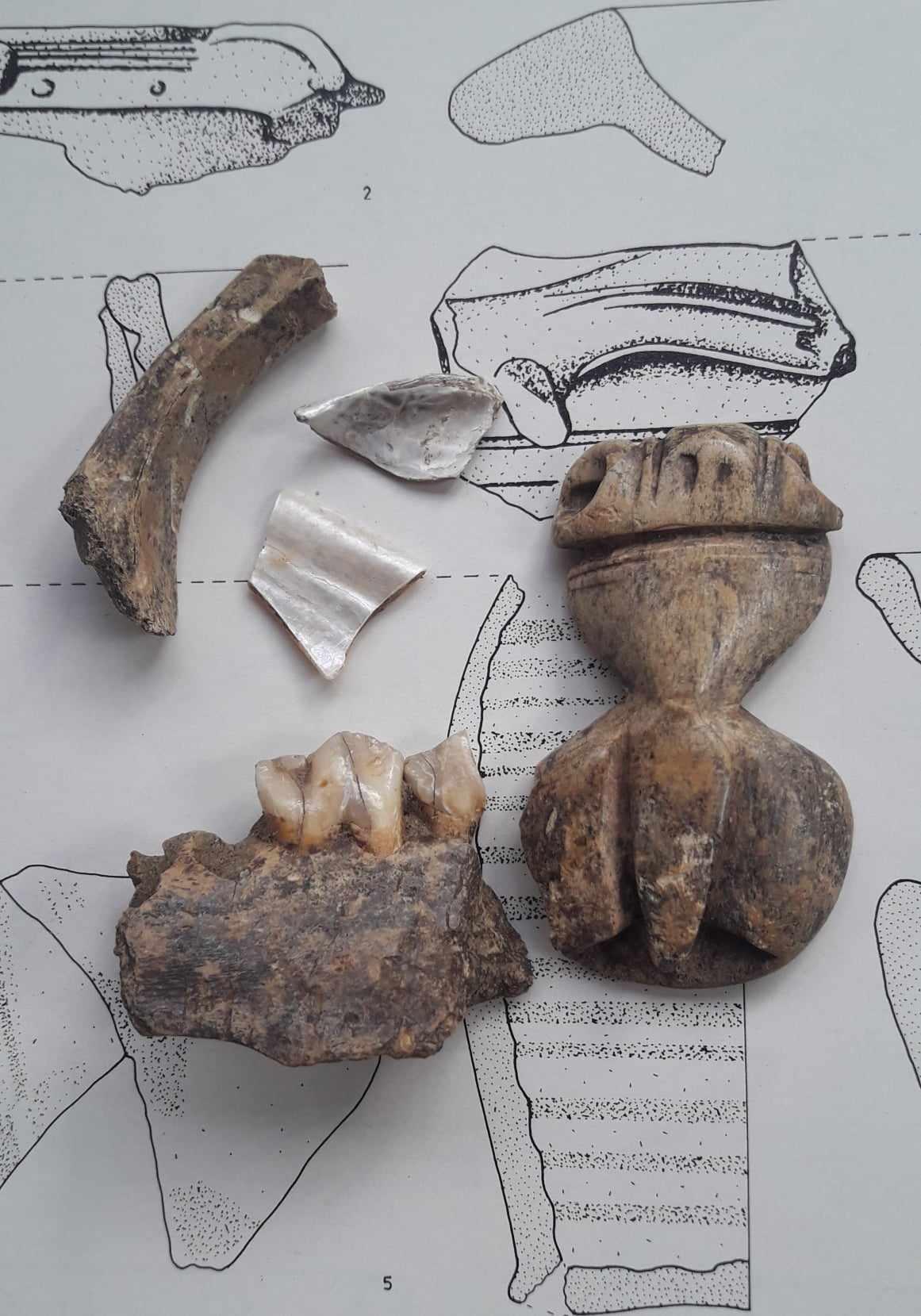
All the broken dishes and amphora were to be expected, but why so many? And why didn’t whoever lived here take their dishes with them when they went? Maybe they left in a hurry, smashing everything on the way out of the door so there was nothing left for the invaders? Or did the dishes simply fall and break when the abandoned wooden shelves rotted away over the centuries? A layer of abandonment was a curious and intriguing thing to contemplate.
Now that she had the experts opinion on the teeth ~ pig, not human ~ haste was needed to quell the growing rumours in the village that she had found human remains. That was the last thing she needed, the neighbours giving her suspicious looks or the authorities roping off her dig with striped plastic tape and putting a police tent over it, messing with the hole she had dug trowel by trowel, rubbing every handful of soil between her fingers. The very thought of it was unbearable. For this reason she rather hoped NOT to find a hoard of valuable ancient coins, contrary to what most people would hope to find. Still, she couldn’t help wonder while she was digging if the next trowel of soil would reveal one.
She must make it absolutely clear to Roger than he was only required to carry buckets of soil, and was not to do any actual digging.
February 1, 2024 at 7:14 am #7334In reply to: The Incense of the Quadrivium’s Mystiques
Impressed with Finnlee’s spirited outburst, Truella realised she’d barely noticed the cleaning lady and felt ashamed. The required daily appearances that the dictatorial Malove insisted upon rankled her, occupying her attention so that the cleanliness or otherwise of the premises went unnoticed. She made up her mind to seek Finnlee out and befriend her, treat her as an equal, draw her into her confidence. Besides, that confident no nonsense approach could come in handy for any staff uprisings. Not that any staff uprising were planned, she mentally added, quickly cloaking her thoughts in case any had leaked out.
Malove spun round and shot her a piercing look and Truella quailed a little, momentarily, but then squared her shoulders and impudently stared back. Malove raised an eyebrow and returned to addressing the witches.
After what seemed like an eternity the meeting was over. Truella planned to seek Finnlee out and invite her for a brew at the Faded Cabbage but Frigella approached her, looking a bit sheepish, and asked if she could have a word in private about a personal matter.
They strolled together towards the little park opposite, and once out of earshot of the others, Frigella came straight to the point.
“Can my cousin come and stay with you for a bit? The thing is, he’s got himself into a spot of bother and needs to disappear for a bit, if you know what I mean. He’s a big strong lad, and I’m sure he’d be willing to give you a hand with all that digging…”
Truella didn’t hesitate. “But of course, Frigella, send him over! He won’t be the first person on the run to come and stay, and probably won’t be the last.”
“The thing is he’s a bit sandwich short of a picnic, you know, not a full bag of shopping…”
“What, does he eat a lot? I don’t do much cooking…”
“No, no, well yes, he does have a good appetite, but that’s not what I meant. He’s a bit simple, but heart of gold. He’s from the other side of the family and our side never had much to do with them, but I always had a soft spot for him.”
” A simpleton might be a refreshing change from all the over complicated people, send him over! What’s his name?”
“Roger. Roger Goodall.”
Roger! The name rang a bell. It wasn’t until much later that Truella realized she should have asked what Roger was on the run for.
January 30, 2024 at 8:32 pm #7327In reply to: The Incense of the Quadrivium’s Mystiques
Her garden, oh, it’s a living canvas of her passions – a wild, untamed thing with bursts of vibrant color and the heady scent of jasmine and orange blossoms that intoxicate the senses. But beneath its beauty lies a secret, a whisper of the past that Truella, with her insatiable curiosity and archeological fervor, has unearthed: the remnants of an Andalucian Roman villa.
Imagine the thrill, the pure, unadulterated bliss of discovery, as her fingers brush away centuries of soil to reveal ornate mosaics, fragments of pottery that once held the finest olive oil, and coins stamped with the visages of long-forgotten emperors. Each artifact, a breadcrumb leading her deeper into the enigma of history.
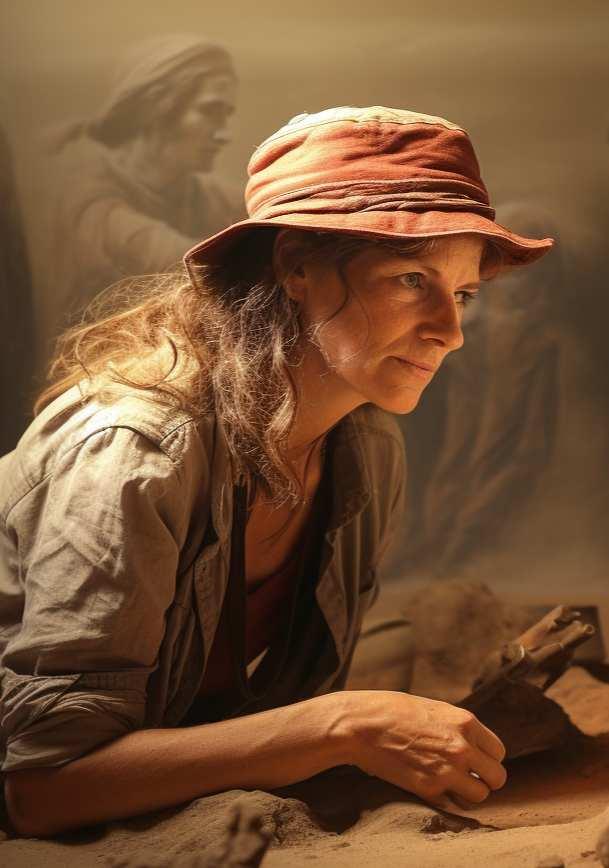
But, of course, Roger, our simple-minded gardener with not a thought in his head beyond petunias and pruning, has proven to be surprisingly useful. His brawn has unearthed more than his fair share of antiquity, even if he hasn’t the faintest idea of its significance. “Look, Truella, I’ve found another shiny rock,” he says, and I, Lisia Tattius, can only chuckle at the delightful irony.
Truella’s Andalusian escapades could fill volumes, and perhaps they shall. There’s something deliciously appealing about a woman alone, grappling with the very fabric of time amongst the ruins of an empire.
Truella couldn’t see any benefit in rewriting all that and thanked Lisia very much, although she did wonder who Roger was. A gardener though! Someone to carry all those buckets of dirt hither and thither. Someone to dig the next overburden!
Was there a spell for dissolving an overburden, she wondered? Inspired, she could already imagine how easy it would be to convince the team that this spell would have beneficial and universal applications.
Truella was pleased to see the mention of mosaics, the very thing she wanted to find. She planned to make a mosaic detector wand. But Truella didn’t want Lisia telling her where the mosaic was because it would spoil the whole thing. Mentioning mosaics, however, as already found, was the perfectly measured tincture of encouragement. A bit like spells in general really. Tricky business, getting them right.
December 6, 2022 at 2:17 pm #6350In reply to: Family Stories From The Other Side ~ Book Two
Transportation
Isaac Stokes 1804-1877
Isaac was born in Churchill, Oxfordshire in 1804, and was the youngest brother of my 4X great grandfather Thomas Stokes. The Stokes family were stone masons for generations in Oxfordshire and Gloucestershire, and Isaac’s occupation was a mason’s labourer in 1834 when he was sentenced at the Lent Assizes in Oxford to fourteen years transportation for stealing tools.
Churchill where the Stokes stonemasons came from: on 31 July 1684 a fire destroyed 20 houses and many other buildings, and killed four people. The village was rebuilt higher up the hill, with stone houses instead of the old timber-framed and thatched cottages. The fire was apparently caused by a baker who, to avoid chimney tax, had knocked through the wall from her oven to her neighbour’s chimney.
Isaac stole a pick axe, the value of 2 shillings and the property of Thomas Joyner of Churchill; a kibbeaux and a trowel value 3 shillings the property of Thomas Symms; a hammer and axe value 5 shillings, property of John Keen of Sarsden.
(The word kibbeaux seems to only exists in relation to Isaac Stokes sentence and whoever was the first to write it was perhaps being creative with the spelling of a kibbo, a miners or a metal bucket. This spelling is repeated in the criminal reports and the newspaper articles about Isaac, but nowhere else).
In March 1834 the Removal of Convicts was announced in the Oxford University and City Herald: Isaac Stokes and several other prisoners were removed from the Oxford county gaol to the Justitia hulk at Woolwich “persuant to their sentences of transportation at our Lent Assizes”.
via digitalpanopticon:
Hulks were decommissioned (and often unseaworthy) ships that were moored in rivers and estuaries and refitted to become floating prisons. The outbreak of war in America in 1775 meant that it was no longer possible to transport British convicts there. Transportation as a form of punishment had started in the late seventeenth century, and following the Transportation Act of 1718, some 44,000 British convicts were sent to the American colonies. The end of this punishment presented a major problem for the authorities in London, since in the decade before 1775, two-thirds of convicts at the Old Bailey received a sentence of transportation – on average 283 convicts a year. As a result, London’s prisons quickly filled to overflowing with convicted prisoners who were sentenced to transportation but had no place to go.
To increase London’s prison capacity, in 1776 Parliament passed the “Hulks Act” (16 Geo III, c.43). Although overseen by local justices of the peace, the hulks were to be directly managed and maintained by private contractors. The first contract to run a hulk was awarded to Duncan Campbell, a former transportation contractor. In August 1776, the Justicia, a former transportation ship moored in the River Thames, became the first prison hulk. This ship soon became full and Campbell quickly introduced a number of other hulks in London; by 1778 the fleet of hulks on the Thames held 510 prisoners.
Demand was so great that new hulks were introduced across the country. There were hulks located at Deptford, Chatham, Woolwich, Gosport, Plymouth, Portsmouth, Sheerness and Cork.The Justitia via rmg collections:

Convicts perform hard labour at the Woolwich Warren. The hulk on the river is the ‘Justitia’. Prisoners were kept on board such ships for months awaiting deportation to Australia. The ‘Justitia’ was a 260 ton prison hulk that had been originally moored in the Thames when the American War of Independence put a stop to the transportation of criminals to the former colonies. The ‘Justitia’ belonged to the shipowner Duncan Campbell, who was the Government contractor who organized the prison-hulk system at that time. Campbell was subsequently involved in the shipping of convicts to the penal colony at Botany Bay (in fact Port Jackson, later Sydney, just to the north) in New South Wales, the ‘first fleet’ going out in 1788.
While searching for records for Isaac Stokes I discovered that another Isaac Stokes was transported to New South Wales in 1835 as well. The other one was a butcher born in 1809, sentenced in London for seven years, and he sailed on the Mary Ann. Our Isaac Stokes sailed on the Lady Nugent, arriving in NSW in April 1835, having set sail from England in December 1834.
Lady Nugent was built at Bombay in 1813. She made four voyages under contract to the British East India Company (EIC). She then made two voyages transporting convicts to Australia, one to New South Wales and one to Van Diemen’s Land (Tasmania). (via Wikipedia)
via freesettlerorfelon website:
On 20 November 1834, 100 male convicts were transferred to the Lady Nugent from the Justitia Hulk and 60 from the Ganymede Hulk at Woolwich, all in apparent good health. The Lady Nugent departed Sheerness on 4 December 1834.
SURGEON OLIVER SPROULE
Oliver Sproule kept a Medical Journal from 7 November 1834 to 27 April 1835. He recorded in his journal the weather conditions they experienced in the first two weeks:
‘In the course of the first week or ten days at sea, there were eight or nine on the sick list with catarrhal affections and one with dropsy which I attribute to the cold and wet we experienced during that period beating down channel. Indeed the foremost berths in the prison at this time were so wet from leaking in that part of the ship, that I was obliged to issue dry beds and bedding to a great many of the prisoners to preserve their health, but after crossing the Bay of Biscay the weather became fine and we got the damp beds and blankets dried, the leaks partially stopped and the prison well aired and ventilated which, I am happy to say soon manifested a favourable change in the health and appearance of the men.
Besides the cases given in the journal I had a great many others to treat, some of them similar to those mentioned but the greater part consisted of boils, scalds, and contusions which would not only be too tedious to enter but I fear would be irksome to the reader. There were four births on board during the passage which did well, therefore I did not consider it necessary to give a detailed account of them in my journal the more especially as they were all favourable cases.
Regularity and cleanliness in the prison, free ventilation and as far as possible dry decks turning all the prisoners up in fine weather as we were lucky enough to have two musicians amongst the convicts, dancing was tolerated every afternoon, strict attention to personal cleanliness and also to the cooking of their victuals with regular hours for their meals, were the only prophylactic means used on this occasion, which I found to answer my expectations to the utmost extent in as much as there was not a single case of contagious or infectious nature during the whole passage with the exception of a few cases of psora which soon yielded to the usual treatment. A few cases of scurvy however appeared on board at rather an early period which I can attribute to nothing else but the wet and hardships the prisoners endured during the first three or four weeks of the passage. I was prompt in my treatment of these cases and they got well, but before we arrived at Sydney I had about thirty others to treat.’
The Lady Nugent arrived in Port Jackson on 9 April 1835 with 284 male prisoners. Two men had died at sea. The prisoners were landed on 27th April 1835 and marched to Hyde Park Barracks prior to being assigned. Ten were under the age of 14 years.
The Lady Nugent:
Isaac’s distinguishing marks are noted on various criminal registers and record books:
“Height in feet & inches: 5 4; Complexion: Ruddy; Hair: Light brown; Eyes: Hazel; Marks or Scars: Yes [including] DEVIL on lower left arm, TSIS back of left hand, WS lower right arm, MHDW back of right hand.”
Another includes more detail about Isaac’s tattoos:
“Two slight scars right side of mouth, 2 moles above right breast, figure of the devil and DEVIL and raised mole, lower left arm; anchor, seven dots half moon, TSIS and cross, back of left hand; a mallet, door post, A, mans bust, sun, WS, lower right arm; woman, MHDW and shut knife, back of right hand.”

From How tattoos became fashionable in Victorian England (2019 article in TheConversation by Robert Shoemaker and Zoe Alkar):
“Historical tattooing was not restricted to sailors, soldiers and convicts, but was a growing and accepted phenomenon in Victorian England. Tattoos provide an important window into the lives of those who typically left no written records of their own. As a form of “history from below”, they give us a fleeting but intriguing understanding of the identities and emotions of ordinary people in the past.
As a practice for which typically the only record is the body itself, few systematic records survive before the advent of photography. One exception to this is the written descriptions of tattoos (and even the occasional sketch) that were kept of institutionalised people forced to submit to the recording of information about their bodies as a means of identifying them. This particularly applies to three groups – criminal convicts, soldiers and sailors. Of these, the convict records are the most voluminous and systematic.
Such records were first kept in large numbers for those who were transported to Australia from 1788 (since Australia was then an open prison) as the authorities needed some means of keeping track of them.”On the 1837 census Isaac was working for the government at Illiwarra, New South Wales. This record states that he arrived on the Lady Nugent in 1835. There are three other indent records for an Isaac Stokes in the following years, but the transcriptions don’t provide enough information to determine which Isaac Stokes it was. In April 1837 there was an abscondment, and an arrest/apprehension in May of that year, and in 1843 there was a record of convict indulgences.
From the Australian government website regarding “convict indulgences”:
“By the mid-1830s only six per cent of convicts were locked up. The vast majority worked for the government or free settlers and, with good behaviour, could earn a ticket of leave, conditional pardon or and even an absolute pardon. While under such orders convicts could earn their own living.”
In 1856 in Camden, NSW, Isaac Stokes married Catherine Daly. With no further information on this record it would be impossible to know for sure if this was the right Isaac Stokes. This couple had six children, all in the Camden area, but none of the records provided enough information. No occupation or place or date of birth recorded for Isaac Stokes.
I wrote to the National Library of Australia about the marriage record, and their reply was a surprise! Issac and Catherine were married on 30 September 1856, at the house of the Rev. Charles William Rigg, a Methodist minister, and it was recorded that Isaac was born in Edinburgh in 1821, to parents James Stokes and Sarah Ellis! The age at the time of the marriage doesn’t match Isaac’s age at death in 1877, and clearly the place of birth and parents didn’t match either. Only his fathers occupation of stone mason was correct. I wrote back to the helpful people at the library and they replied that the register was in a very poor condition and that only two and a half entries had survived at all, and that Isaac and Catherines marriage was recorded over two pages.
I searched for an Isaac Stokes born in 1821 in Edinburgh on the Scotland government website (and on all the other genealogy records sites) and didn’t find it. In fact Stokes was a very uncommon name in Scotland at the time. I also searched Australian immigration and other records for another Isaac Stokes born in Scotland or born in 1821, and found nothing. I was unable to find a single record to corroborate this mysterious other Isaac Stokes.
As the age at death in 1877 was correct, I assume that either Isaac was lying, or that some mistake was made either on the register at the home of the Methodist minster, or a subsequent mistranscription or muddle on the remnants of the surviving register. Therefore I remain convinced that the Camden stonemason Isaac Stokes was indeed our Isaac from Oxfordshire.
I found a history society newsletter article that mentioned Isaac Stokes, stone mason, had built the Glenmore church, near Camden, in 1859.

From the Wollondilly museum April 2020 newsletter:

From the Camden History website:
“The stone set over the porch of Glenmore Church gives the date of 1860. The church was begun in 1859 on land given by Joseph Moore. James Rogers of Picton was given the contract to build and local builder, Mr. Stokes, carried out the work. Elizabeth Moore, wife of Edward, laid the foundation stone. The first service was held on 19th March 1860. The cemetery alongside the church contains the headstones and memorials of the areas early pioneers.”
Isaac died on the 3rd September 1877. The inquest report puts his place of death as Bagdelly, near to Camden, and another death register has put Cambelltown, also very close to Camden. His age was recorded as 71 and the inquest report states his cause of death was “rupture of one of the large pulmonary vessels of the lung”. His wife Catherine died in childbirth in 1870 at the age of 43.
Isaac and Catherine’s children:
William Stokes 1857-1928
Catherine Stokes 1859-1846
Sarah Josephine Stokes 1861-1931
Ellen Stokes 1863-1932
Rosanna Stokes 1865-1919
Louisa Stokes 1868-1844.
It’s possible that Catherine Daly was a transported convict from Ireland.
Some time later I unexpectedly received a follow up email from The Oaks Heritage Centre in Australia.
“The Gaudry papers which we have in our archive record him (Isaac Stokes) as having built: the church, the school and the teachers residence. Isaac is recorded in the General return of convicts: 1837 and in Grevilles Post Office directory 1872 as a mason in Glenmore.”
 November 18, 2022 at 4:47 pm #6348
November 18, 2022 at 4:47 pm #6348In reply to: Family Stories From The Other Side ~ Book Two
Wong Sang
Wong Sang was born in China in 1884. In October 1916 he married Alice Stokes in Oxford.
Alice was the granddaughter of William Stokes of Churchill, Oxfordshire and William was the brother of Thomas Stokes the wheelwright (who was my 3X great grandfather). In other words Alice was my second cousin, three times removed, on my fathers paternal side.
Wong Sang was an interpreter, according to the baptism registers of his children and the Dreadnought Seamen’s Hospital admission registers in 1930. The hospital register also notes that he was employed by the Blue Funnel Line, and that his address was 11, Limehouse Causeway, E 14. (London)
“The Blue Funnel Line offered regular First-Class Passenger and Cargo Services From the UK to South Africa, Malaya, China, Japan, Australia, Java, and America. Blue Funnel Line was Owned and Operated by Alfred Holt & Co., Liverpool.
The Blue Funnel Line, so-called because its ships have a blue funnel with a black top, is more appropriately known as the Ocean Steamship Company.”Wong Sang and Alice’s daughter, Frances Eileen Sang, was born on the 14th July, 1916 and baptised in 1920 at St Stephen in Poplar, Tower Hamlets, London. The birth date is noted in the 1920 baptism register and would predate their marriage by a few months, although on the death register in 1921 her age at death is four years old and her year of birth is recorded as 1917.
Charles Ronald Sang was baptised on the same day in May 1920, but his birth is recorded as April of that year. The family were living on Morant Street, Poplar.
James William Sang’s birth is recorded on the 1939 census and on the death register in 2000 as being the 8th March 1913. This definitely would predate the 1916 marriage in Oxford.
William Norman Sang was born on the 17th October 1922 in Poplar.
Alice and the three sons were living at 11, Limehouse Causeway on the 1939 census, the same address that Wong Sang was living at when he was admitted to Dreadnought Seamen’s Hospital on the 15th January 1930. Wong Sang died in the hospital on the 8th March of that year at the age of 46.
Alice married John Patterson in 1933 in Stepney. John was living with Alice and her three sons on Limehouse Causeway on the 1939 census and his occupation was chef.
Via Old London Photographs:
“Limehouse Causeway is a street in east London that was the home to the original Chinatown of London. A combination of bomb damage during the Second World War and later redevelopment means that almost nothing is left of the original buildings of the street.”
Limehouse Causeway in 1925:

From The Story of Limehouse’s Lost Chinatown, poplarlondon website:
“Limehouse was London’s first Chinatown, home to a tightly-knit community who were demonised in popular culture and eventually erased from the cityscape.
As recounted in the BBC’s ‘Our Greatest Generation’ series, Connie was born to a Chinese father and an English mother in early 1920s Limehouse, where she used to play in the street with other British and British-Chinese children before running inside for teatime at one of their houses.
Limehouse was London’s first Chinatown between the 1880s and the 1960s, before the current Chinatown off Shaftesbury Avenue was established in the 1970s by an influx of immigrants from Hong Kong.
Connie’s memories of London’s first Chinatown as an “urban village” paint a very different picture to the seedy area portrayed in early twentieth century novels.
The pyramid in St Anne’s church marked the entrance to the opium den of Dr Fu Manchu, a criminal mastermind who threatened Western society by plotting world domination in a series of novels by Sax Rohmer.
Thomas Burke’s Limehouse Nights cemented stereotypes about prostitution, gambling and violence within the Chinese community, and whipped up anxiety about sexual relationships between Chinese men and white women.
Though neither novelist was familiar with the Chinese community, their depictions made Limehouse one of the most notorious areas of London.
Travel agent Thomas Cook even organised tours of the area for daring visitors, despite the rector of Limehouse warning that “those who look for the Limehouse of Mr Thomas Burke simply will not find it.”
All that remains is a handful of Chinese street names, such as Ming Street, Pekin Street, and Canton Street — but what was Limehouse’s chinatown really like, and why did it get swept away?
Chinese migration to Limehouse
Chinese sailors discharged from East India Company ships settled in the docklands from as early as the 1780s.
By the late nineteenth century, men from Shanghai had settled around Pennyfields Lane, while a Cantonese community lived on Limehouse Causeway.
Chinese sailors were often paid less and discriminated against by dock hirers, and so began to diversify their incomes by setting up hand laundry services and restaurants.
Old photographs show shopfronts emblazoned with Chinese characters with horse-drawn carts idling outside or Chinese men in suits and hats standing proudly in the doorways.
In oral histories collected by Yat Ming Loo, Connie’s husband Leslie doesn’t recall seeing any Chinese women as a child, since male Chinese sailors settled in London alone and married working-class English women.
In the 1920s, newspapers fear-mongered about interracial marriages, crime and gambling, and described chinatown as an East End “colony.”
Ironically, Chinese opium-smoking was also demonised in the press, despite Britain waging war against China in the mid-nineteenth century for suppressing the opium trade to alleviate addiction amongst its people.
The number of Chinese people who settled in Limehouse was also greatly exaggerated, and in reality only totalled around 300.
The real Chinatown
Although the press sought to characterise Limehouse as a monolithic Chinese community in the East End, Connie remembers seeing people of all nationalities in the shops and community spaces in Limehouse.
She doesn’t remember feeling discriminated against by other locals, though Connie does recall having her face measured and IQ tested by a member of the British Eugenics Society who was conducting research in the area.
Some of Connie’s happiest childhood memories were from her time at Chung-Hua Club, where she learned about Chinese culture and language.
Why did Chinatown disappear?
The caricature of Limehouse’s Chinatown as a den of vice hastened its erasure.
Police raids and deportations fuelled by the alarmist media coverage threatened the Chinese population of Limehouse, and slum clearance schemes to redevelop low-income areas dispersed Chinese residents in the 1930s.
The Defence of the Realm Act imposed at the beginning of the First World War criminalised opium use, gave the authorities increased powers to deport Chinese people and restricted their ability to work on British ships.
Dwindling maritime trade during World War II further stripped Chinese sailors of opportunities for employment, and any remnants of Chinatown were destroyed during the Blitz or erased by postwar development schemes.”
Wong Sang 1884-1930
The year 1918 was a troublesome one for Wong Sang, an interpreter and shipping agent for Blue Funnel Line. The Sang family were living at 156, Chrisp Street.
Chrisp Street, Poplar, in 1913 via Old London Photographs:

In February Wong Sang was discharged from a false accusation after defending his home from potential robbers.
East End News and London Shipping Chronicle – Friday 15 February 1918:

In August of that year he was involved in an incident that left him unconscious.
Faringdon Advertiser and Vale of the White Horse Gazette – Saturday 31 August 1918:

Wong Sang is mentioned in an 1922 article about “Oriental London”.
London and China Express – Thursday 09 February 1922:

A photograph of the Chee Kong Tong Chinese Freemason Society mentioned in the above article, via Old London Photographs:

Wong Sang was recommended by the London Metropolitan Police in 1928 to assist in a case in Wellingborough, Northampton.
Difficulty of Getting an Interpreter: Northampton Mercury – Friday 16 March 1928:


The difficulty was that “this man speaks the Cantonese language only…the Northeners and the Southerners in China have differing languages and the interpreter seemed to speak one that was in between these two.”
In 1917, Alice Wong Sang was a witness at her sister Harriet Stokes marriage to James William Watts in Southwark, London. Their father James Stokes occupation on the marriage register is foreman surveyor, but on the census he was a council roadman or labourer. (I initially rejected this as the correct marriage for Harriet because of the discrepancy with the occupations. Alice Wong Sang as a witness confirmed that it was indeed the correct one.)

James William Sang 1913-2000 was a clock fitter and watch assembler (on the 1939 census). He married Ivy Laura Fenton in 1963 in Sidcup, Kent. James died in Southwark in 2000.
Charles Ronald Sang 1920-1974 was a draughtsman (1939 census). He married Eileen Burgess in 1947 in Marylebone. Charles and Eileen had two sons: Keith born in 1951 and Roger born in 1952. He died in 1974 in Hertfordshire.
William Norman Sang 1922-2000 was a clerk and telephone operator (1939 census). William enlisted in the Royal Artillery in 1942. He married Lily Mullins in 1949 in Bethnal Green, and they had three daughters: Marion born in 1950, Christine in 1953, and Frances in 1959. He died in Redbridge in 2000.
I then found another two births registered in Poplar by Alice Sang, both daughters. Doris Winifred Sang was born in 1925, and Patricia Margaret Sang was born in 1933 ~ three years after Wong Sang’s death. Neither of the these daughters were on the 1939 census with Alice, John Patterson and the three sons. Margaret had presumably been evacuated because of the war to a family in Taunton, Somerset. Doris would have been fourteen and I have been unable to find her in 1939 (possibly because she died in 2017 and has not had the redaction removed yet on the 1939 census as only deceased people are viewable).
Doris Winifred Sang 1925-2017 was a nursing sister. She didn’t marry, and spent a year in USA between 1954 and 1955. She stayed in London, and died at the age of ninety two in 2017.
Patricia Margaret Sang 1933-1998 was also a nurse. She married Patrick L Nicely in Stepney in 1957. Patricia and Patrick had five children in London: Sharon born 1959, Donald in 1960, Malcolm was born and died in 1966, Alison was born in 1969 and David in 1971.
I was unable to find a birth registered for Alice’s first son, James William Sang (as he appeared on the 1939 census). I found Alice Stokes on the 1911 census as a 17 year old live in servant at a tobacconist on Pekin Street, Limehouse, living with Mr Sui Fong from Hong Kong and his wife Sarah Sui Fong from Berlin. I looked for a birth registered for James William Fong instead of Sang, and found it ~ mothers maiden name Stokes, and his date of birth matched the 1939 census: 8th March, 1913.
On the 1921 census, Wong Sang is not listed as living with them but it is mentioned that Mr Wong Sang was the person returning the census. Also living with Alice and her sons James and Charles in 1921 are two visitors: (Florence) May Stokes, 17 years old, born in Woodstock, and Charles Stokes, aged 14, also born in Woodstock. May and Charles were Alice’s sister and brother.
I found Sharon Nicely on social media and she kindly shared photos of Wong Sang and Alice Stokes:

 October 11, 2022 at 2:58 pm #6334
October 11, 2022 at 2:58 pm #6334In reply to: Family Stories From The Other Side ~ Book Two
The House on Penn Common
Toi Fang and the Duke of Sutherland
Tomlinsons

Grassholme
Charles Tomlinson (1873-1929) my great grandfather, was born in Wolverhampton in 1873. His father Charles Tomlinson (1847-1907) was a licensed victualler or publican, or alternatively a vet/castrator. He married Emma Grattidge (1853-1911) in 1872. On the 1881 census they were living at The Wheel in Wolverhampton.
Charles married Nellie Fisher (1877-1956) in Wolverhampton in 1896. In 1901 they were living next to the post office in Upper Penn, with children (Charles) Sidney Tomlinson (1896-1955), and Hilda Tomlinson (1898-1977) . Charles was a vet/castrator working on his own account.
In 1911 their address was 4, Wakely Hill, Penn, and living with them were their children Hilda, Frank Tomlinson (1901-1975), (Dorothy) Phyllis Tomlinson (1905-1982), Nellie Tomlinson (1906-1978) and May Tomlinson (1910-1983). Charles was a castrator working on his own account.
Charles and Nellie had a further four children: Charles Fisher Tomlinson (1911-1977), Margaret Tomlinson (1913-1989) (my grandmother Peggy), Major Tomlinson (1916-1984) and Norah Mary Tomlinson (1919-2010).
My father told me that my grandmother had fallen down the well at the house on Penn Common in 1915 when she was two years old, and sent me a photo of her standing next to the well when she revisted the house at a much later date.
Peggy next to the well on Penn Common:
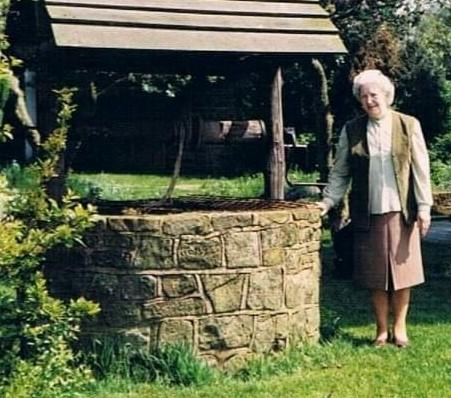
My grandmother Peggy told me that her father had had a racehorse called Toi Fang. She remembered the racing colours were sky blue and orange, and had a set of racing silks made which she sent to my father.
Through a DNA match, I met Ian Tomlinson. Ian is the son of my fathers favourite cousin Roger, Frank’s son. Ian found some racing silks and sent a photo to my father (they are now in contact with each other as a result of my DNA match with Ian), wondering what they were.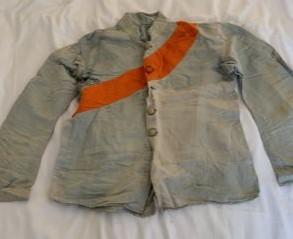
When Ian sent a photo of these racing silks, I had a look in the newspaper archives. In 1920 there are a number of mentions in the racing news of Mr C Tomlinson’s horse TOI FANG. I have not found any mention of Toi Fang in the newspapers in the following years.
The Scotsman – Monday 12 July 1920:
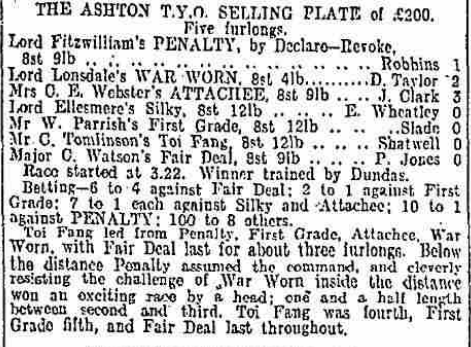
The other story that Ian Tomlinson recalled was about the house on Penn Common. Ian said he’d heard that the local titled person took Charles Tomlinson to court over building the house but that Tomlinson won the case because it was built on common land and was the first case of it’s kind.
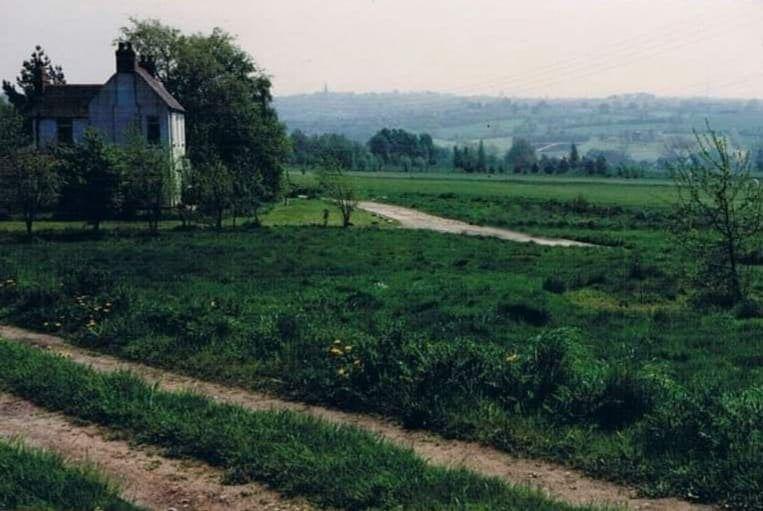
Penn Common Right of Way Case:
Staffordshire Advertiser March 9, 1912In the chancery division, on Tuesday, before Mr Justice Joyce, it was announced that a settlement had been arrived at of the Penn Common Right of Way case, the hearing of which occupied several days last month. The action was brought by the Duke of Sutherland (as Lord of the Manor of Penn) and Mr Harry Sydney Pitt (on behalf of himself and other freeholders of the manor having a right to pasturage on Penn Common) to restrain Mr James Lakin, Carlton House, Penn; Mr Charles Tomlinson, Mayfield Villa, Wakely Hill, Penn; and Mr Joseph Harold Simpkin, Dudley Road, Wolverhampton, from drawing building materials across the common, or otherwise causing injury to the soil.
The real point in dispute was whether there was a public highway for all purposes running by the side of the defendants land from the Turf Tavern past the golf club to the Barley Mow.
Mr Hughes, KC for the plaintiffs, now stated that the parties had been in consultation, and had come to terms, the substance of which was that the defendants admitted that there was no public right of way, and that they were granted a private way. This, he thought, would involve the granting of some deed or deeds to express the rights of the parties, and he suggested that the documents should be be settled by some counsel to be mutually agreed upon.His lordship observed that the question of coal was probably the important point. Mr Younger said Mr Tomlinson was a freeholder, and the plaintiffs could not mine under him. Mr Hughes: The coal actually under his house is his, and, of course, subsidence might be produced by taking away coal some distance away. I think some document is required to determine his actual rights.
Mr Younger said he wanted to avoid anything that would increase the costs, but, after further discussion, it was agreed that Mr John Dixon (an expert on mineral rights), or failing him, another counsel satisfactory to both parties, should be invited to settle the terms scheduled in the agreement, in order to prevent any further dispute.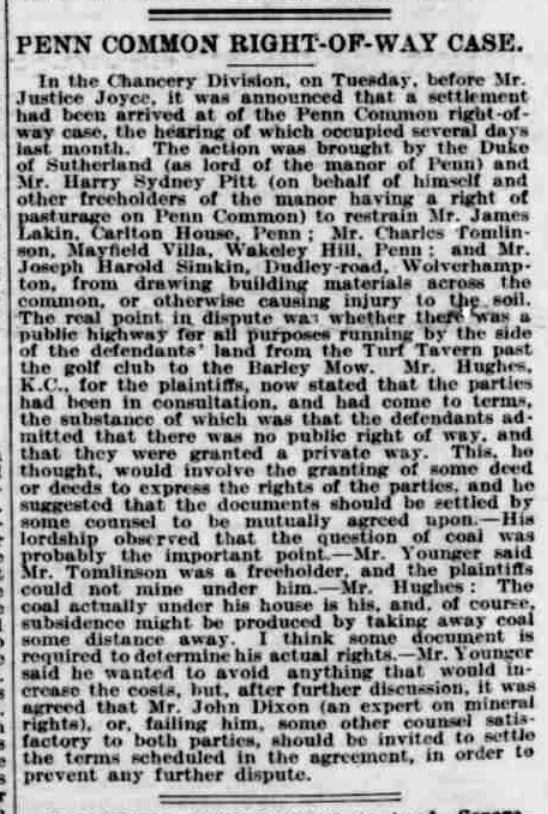
The name of the house is Grassholme. The address of Mayfield Villas is the house they were living in while building Grassholme, which I assume they had not yet moved in to at the time of the newspaper article in March 1912.
What my grandmother didn’t tell anyone was how her father died in 1929:
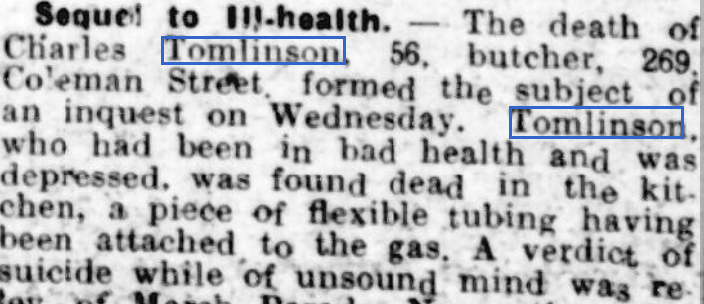
On the 1921 census, Charles, Nellie and eight of their children were living at 269 Coleman Street, Wolverhampton.
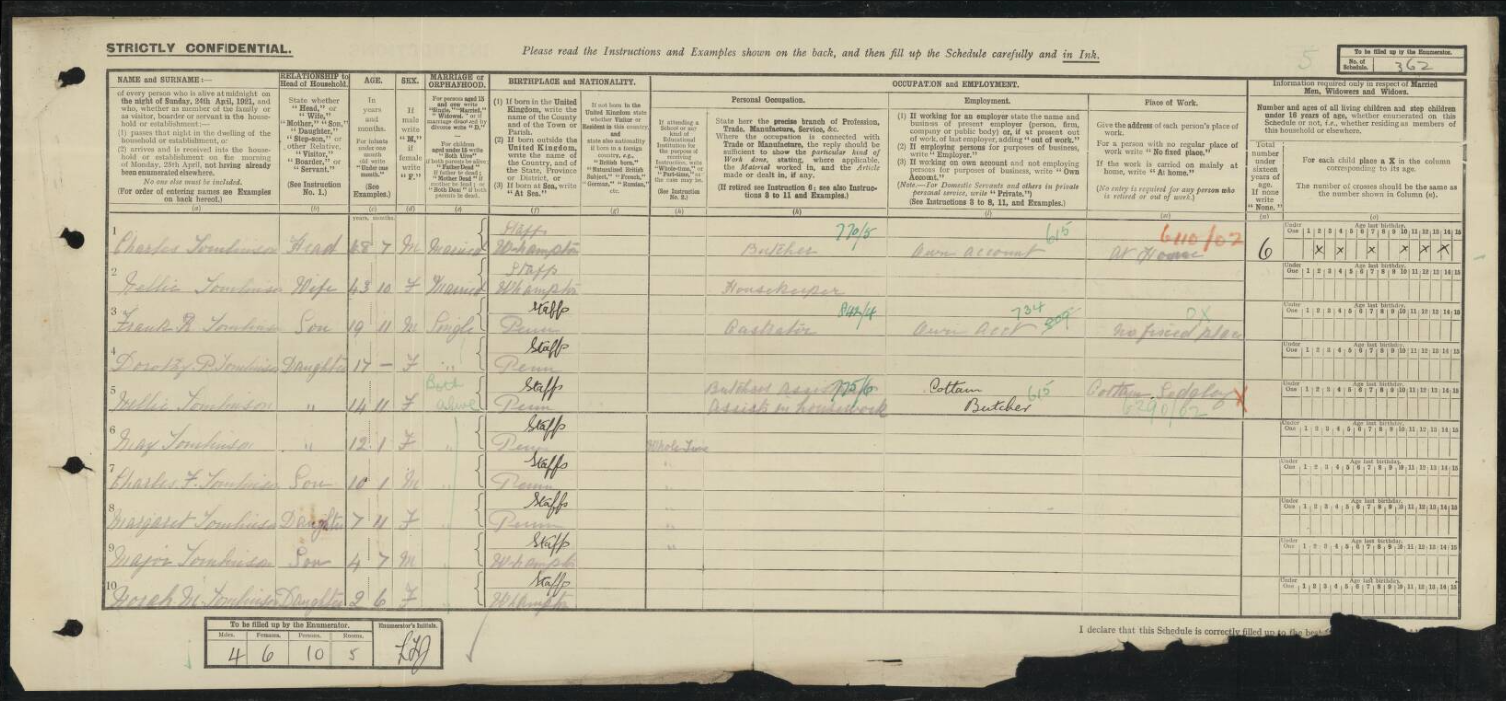
They were living on Coleman Street in 1915 when Charles was fined for staying open late.
Staffordshire Advertiser – Saturday 13 February 1915:

What is not yet clear is why they moved from the house on Penn Common sometime between 1912 and 1915. And why did he have a racehorse in 1920?
May 26, 2020 at 10:06 am #6086In reply to: Tart Wreck Repackage
“A dil-do factory?” She was aghast. “A fucking carrot dildo factory?”
“Admit it, we’re rubbish at this” Tara said. “Even Rosamund may be better at this than us.”
“Oh don’t push it.” Star lit a large cigar, a nasty habit that cropped up when she was nervous. She blew a smoke ring and sighed. “At least the rogering was a nice change. Good clean sex, almost a spiritual experience.”
“Oh come now, with all the don’t-need-to-know details…”
“Well, don’t be such a prude, you were there after all. With all that luscious moaning. Haven’t seen you so flushed in ages…” Star tittered in that high-pitched laughter that could shatter crystal flutes.
“Wait… a minute.” Tara was having a brainwave. “We may have overlooked something.”
“What? In the sex department?”
“Shush, you lascivious banshee… In the flushed department.”
“What? Don’t speak riddles tart, I can’t handle riddles when my body’s aching from all that gymnastic.”
“Can’t you see? They got to get rid of the dissident stuff unfit for cultish dildoing, if you catch my drift.”
“Oh I catch it alright, but I’ve checked the loo… Oh, what? you mean the compost pile?”
“I’ve seen trucks parked out the back, they where labelled… Organic Lou’s Disposal Services… OLDS… That’s probably how they remove their archives, if you see what I mean.”
“Alright, alright, we’ll go investigate them tomorrow. Meanwhile, what about Mr French?” Star was puffing on her cigar making a good effort at trying to remember and link the details together.
“I have a theory. Although it usually would be more in your area of theories.”
“What? Alien abduction?”
“No, don’t be ridiculous. I’m talking time travel… Haven’t you noticed the scent of celery when we were at the mansion and the appartment?”
“A dead give-away for time-travelling shenanigans!”
“Exactly. And if I’m correct, might well be that it’s Mr French from the future who phoned us, before he returned to his timeline. Probably because he already knows we’re going to crack the case. Before we know.”
“Oh, that’s nice. Would have been nicer if he’d told us how to solve it instead, if he knew, from the future and all? Are you not sure he’s not from his past instead, like before he got in that dreadful car accident?”
“Oh well, doesn’t matter does it? And probably won’t any longer once we locate the Uncle Basil in the Drooling Home of Retired Vegetables.”
December 16, 2017 at 2:54 am #4403In reply to: Eight Turns of the Wheel
random plot generator
A BOOK SHOP – IT IS THE AFTERNOON AFTER ALBIE HIT HIS MOTHER WITH A FEATHER.
Newly unemployed ALBIE is arguing with his friend JENNY RAMSBOTTOM. ALBIE tries to hug JENNY but she shakes him off angrily.
ALBIE
Please Jenny, don’t leave me.JENNY
I’m sorry Albie, but I’m looking for somebody a bit more brave. Somebody who faces his fears head on, instead of running away. You hit your mother with a feather! You could have just talked to her!ALBIE
I am such a person!JENNY
I’m sorry, Albie. I just don’t feel excited by this relationship anymore.JENNY leaves and ALBIE sits down, looking defeated.
Moments later, gentle sweet shop owner MR MATT HUMBLE barges in looking flustered.
ALBIE
Goodness, Matt! Is everything okay?MATT
I’m afraid not.ALBIE
What is it? Don’t keep me in suspense…MATT
It’s … a hooligan … I saw an evil hooligan frighten a bunch of elderly ladies!ALBIE
Defenseless elderly ladies?MATT
Yes, defenseless elderly ladies!ALBIE
Bloomin’ heck, Matt! We’ve got to do something.MATT
I agree, but I wouldn’t know where to start.ALBIE
You can start by telling me where this happened.MATT
I was…
MATT fans himself and begins to wheeze.ALBIE
Focus Matt, focus! Where did it happen?MATT
The Library! That’s right – the Library!ALBIE springs up and begins to run.
EXT. A ROAD – CONTINUOUS
ALBIE rushes along the street, followed by MATT. They take a short cut through some back gardens, jumping fences along the way.
INT. A LIBRARY – SHORTLY AFTER
ROGER BLUNDER a forgetful hooligan terrorises two elderly ladies.
ALBIE, closely followed by MATT, rushes towards ROGER, but suddenly stops in his tracks.
MATT
What is is? What’s the matter?ALBIE
That’s not just any old hooligan, that’s Roger Blunder!MATT
Who’s Roger Blunder?ALBIE
Who’s Roger Blunder? Who’s Roger Blunder? Only the most forgetful hooligan in the universe!MATT
Blinkin’ knickers, Albie! We’re going to need some help if we’re going to stop the most forgetful hooligan in the universe!ALBIE
You can say that again.MATT
Blinkin’ knickers, Albie! We’re going to need some help if we’re going to stop the most forgetful hooligan in the universe!ALBIE
I’m going to need candlesticks, lots of candlesticks.Roger turns and sees Albie and Matt. He grins an evil grin.
ROGER
Albie Jones, we meet again!MATT
You’ve met?ALBIE
Yes. It was a long, long time ago…EXT. A PARK – BACK IN TIME
A young ALBIE is sitting in a park listening to some trance music, when suddenly a dark shadow casts over him.
He looks up and sees ROGER. He takes off his headphones.
ROGER
Would you like some wine gums?ALBIE’s eyes light up, but then he studies ROGER more closely, and looks uneasy.
ALBIE
I don’t know, you look kind of forgetful.ROGER
Me? No. I’m not forgetful. I’m the least forgetful hooligan in the world.ALBIE
Wait, you’re a hooligan?ALBIE runs away, screaming.
INT. A LIBRARY – PRESENT DAY
ROGER
You were a coward then, and you are a coward now.MATT
(To ALBIE) You ran away?
ALBIE
(To MATT) I was a young child. What was I supposed to do?
ALBIE turns to ROGER.ALBIE
I may have run away from you then, but I won’t run away this time!
ALBIE runs away.He turns back and shouts.
ALBIE
I mean, I am running away, but I’ll be back – with candlesticks.ROGER
I’m not scared of you.ALBIE
You should be.INT. A SWEET SHOP – LATER THAT DAY
ALBIE and MATT walk around searching for something.
ALBIE
I feel sure I left my candlesticks somewhere around here.MATT
Are you sure? It does seem like an odd place to keep deadly candlesticks.ALBIE
You know nothing Matt Humble.MATT
We’ve been searching for ages. I really don’t think they’re here.Suddenly, ROGER appears, holding a pair of candlesticks.
ROGER
Looking for something?MATT
Crikey, Albie, he’s got your candlesticks.ALBIE
Tell me something I don’t already know!MATT
The earth’s circumference at the equator is about 40,075 km.ALBIE
I know that already!MATT
I’m afraid of dust.ROGER
(appalled) Dude!While ROGER is looking at MATT with disgust, ALBIE lunges forward and grabs his deadly candlesticks. He wields them, triumphantly.
ALBIE
Prepare to die, you forgetful aubergine!ROGER
No please! All I did was frighten a bunch of elderly ladies!JENNY enters, unseen by any of the others.
ALBIE
I cannot tolerate that kind of behaviour! Those elderly ladies were defenceless! Well now they have a defender – and that’s me! Albie Jones defender of innocent elderly ladies.ROGER
Don’t hurt me! Please!ALBIE
Give me one good reason why I shouldn’t use these candlesticks on you right away!ROGER
Because Albie, I am your father.ALBIE looks stunned for a few moments, but then collects himself.
ALBIE
No you’re not!ROGER
Ah well, it had to be worth a try.ROGER tries to grab the candlesticks but ALBIE dodges out of the way.
ALBIE
Who’s the daddy now? Huh? Huh?Unexpectedly, ROGER slumps to the ground.
MATT
Did he just faint?ALBIE
I think so. Well that’s disappointing. I was rather hoping for a more dramatic conclusion, involving my deadly candlesticks.ALBIE crouches over ROGER’s body.
MATT
Be careful, Albie. It could be a trick.ALBIE
No, it’s not a trick. It appears that… It would seem… Roger Blunder is dead!ALBIE
What?ALBIE
Yes, it appears that I scared him to death.MATT claps his hands.
MATT
So your candlesticks did save the day, after all.JENNY steps forward.
JENNY
Is it true? Did you kill the forgetful hooligan?ALBIE
Jenny how long have you been…?JENNY puts her arm around ALBIE.
JENNY
Long enough.ALBIE
Then you saw it for yourself. I killed Roger Blunder.JENNY
Then the elderly ladies are safe?ALBIE
It does seem that way!A crowd of vulnerable elderly ladies enter, looking relived.
JENNY
You are their hero.The elderly ladies bow to ALBIE.
ALBIE
There is no need to bow to me. I seek no worship. The knowledge that Roger Blunder will never frighten elderly ladies ever again, is enough for me.JENNY
You are humble as well as brave! And I think that makes up for hitting your mother with a feather. It does in my opinion!One of the elderly ladies passes ALBIE a healing ring
JENNY
I think they want you to have it, as a symbol of their gratitude.ALBIE
I couldn’t possibly.
Pause.ALBIE
Well, if you insist. It could come in handy when I go to the Doline tomorrow. With my friend Matt. It is dangerous and only for brave people and a healing ring could come in handy.ALBIE takes the ring.
ALBIE
Thank you.
The elderly ladies bow their heads once more, and leave.ALBIE turns to JENNY.
ALBIE
Does this mean you want me back?JENNY
Oh, Albie, of course I want you back!
ALBIE smiles for a few seconds, but then looks defiant.ALBIE
Well you can’t have me.JENNY
WHAT?ALBIE
You had no faith in me. You had to see my scare a hooligan to death before you would believe in me. I don’t want a lover like that. And I am going to the Doline and I may not be back!JENNY
But…ALBIE
Please leave. I want to spend time with the one person who stayed with me through thick and thin – my best friend, Matt.MATT grins.
JENNY
But…MATT
You heard the gentleman. Now be off with you. Skidaddle! Shoo!JENNY
Albie?ALBIE
I’m sorry Jenny, but I think you should skidaddle.
JENNY leaves.MATT turns to ALBIE.
MATT
Did you mean that? You know … that I’m your best friend?ALBIE
Of course you are!
The two walk off arm in arm.Suddenly MATT stops.
MATT
When I said I’m afraid of dust, you know I was just trying to distract the hooligan don’t you?March 26, 2009 at 9:52 am #2177In reply to: Closing up
Started a new thread, so that people who weren’t comfortable re-using our previous characters can use it for that purpose, as there were quite a few synchs with the stories at the Kryon event in Madrid — the mad doctor and the beauty treatments (he even did some dancing in a sort of leotard that might have been as close as a tutu as he could allow himself to wear ahahah), magpies sightings, the translator was named Roger, there was a lady named Peggy (probably her real name was T’Eggy) and we managed to have Geoffidoo say “watermelon” (we’re expecting Tobidoo to do the same at the next monthly event)… and also met Pedro the Universe
-
AuthorSearch Results